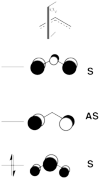Différences entre les versions de « VBTutorial4 »
m |
|||
| Ligne 85 : | Ligne 85 : | ||
'''Step by step help :''' | '''Step by step help :''' | ||
| + | |||
1/ Perform a NH3 BLW calculation of the fragment alone in the geometry of the complexe with $BLW NBLOCK=1 and keep the .blw file for next step (same for BH3). | 1/ Perform a NH3 BLW calculation of the fragment alone in the geometry of the complexe with $BLW NBLOCK=1 and keep the .blw file for next step (same for BH3). | ||
Version du 5 juin 2012 à 17:05
How to modify this page :
- first : log in (top right of this page) ;
- click on [edit] (far right) to edit a section of the page ;
- write your text directly in the wiki page, and click on the "Save page" button (bottom left) to save your modifications
Pictures : how to insert a picture in your text
See also this page for an introduction to the basics of the wiki syntax
To the Tutors
Sason remarks and prospective 2 hours talk +
Philippe's remark on the initially proposed tutorial. are included in bold.
Qualitative
- ?...
Computational
Proposal from Yirong
- benzene and formamide - focus is on the structural and energetic impact from conjugation, and how to correlate the results with experimental evidences;
- butadiene - focus is on the conjugation in the planar structure and the hyperconjugation in the staggered structure, and their impact on the rotational barrier;
- acid-base and H-bonding systems: BLW energy decomposition analyses.
- visualize the results. I have been using GaussView and ChemDraw, but other graphical software should be fine with me as well.
- Questions from any participant can be discussed and tested on site.
Exercices
Exercice 1 (title)
Subject
Here is a image example
This is some text. Text text Text text Text text Text text Text text Text text Text text Text text Text text Text text Text text Text text Text text Text text Text text Text text Text text Text text Text text Text text Text text Text text Text text Text text Text text Text text Text text
a line that starts with a blanck character make a sort of box
Text text text
To do
Text text Text text Text text Text text Text text Text text Text text Text text Text text Text text Text text Text text
Text text Text text Texttext Text text Text text Text text Text text Text text Text text Text text Text text Text text Text text Text text
Access to files :
Exercice 2 (title)
Exercice 3 (title)
Exercice 4 (BH3... NH3) electronics at the B3LYP 6-31G(d) level
BLW energy decomposition analysis can be used to shed light into the nature of intermolecular interactions. Example of NH3∙∙∙BH3. Visualize the polarization and electron transfer effects using the electron density difference (EDD) maps.
1/ Make orbitals of BH3 alone (then NH3) in the geometry of the complex
$DATA BLW-ED Analysis C1 N 7.0 0.000000 0.000000 0.728869 H 1.0 0.000000 0.951707 1.095972 H 1.0 0.824202 -0.475853 1.095972 H 1.0 -0.824202 -0.475853 1.095972 B 5.0 0.000000 0.000000 -0.934793 H 1.0 0.000000 -1.170908 -1.238679 H 1.0 -1.014036 0.585454 -1.238679 H 1.0 1.014036 0.585454 -1.238679 $END
2/ Let fragment orbitals to polarize in the full complex.
3/ Let delocalize. This is just a standard DFT calculation. (TO CHECK with Yirong)
Preliminary Remarks : B3LYP calculation in Gamess is specified in $CONTRL :
$CONTRL SCFTYP=RHF DFTTYP=B3LYP runtyp=energy maxit=200 icharg=0 $END
And 6-31G(d) basis set is requested with
$BASIS GBASIS=N31 NGAUSS=6 NDFUNC=1 $END
Step by step help :
1/ Perform a NH3 BLW calculation of the fragment alone in the geometry of the complexe with $BLW NBLOCK=1 and keep the .blw file for next step (same for BH3).
We obtain
nh3.log: FINAL R-B3LYP ENERGY IS -56.5111505350
bh3.log: FINAL R-B3LYP ENERGY IS -26.5644674370
= > summ = -83.07561797
2/ Do the complex in a NBLOCK=2 BLW calculation and see the polarization of each fragment. The initial orbitals are obtained from .blw files of individual fragments ---ORBITALS (LOCAL BFS)--- part, and copied after the $BLWDAT fragments definition. A blank line separate each fragments’guess.
At this stage, we can want to do the calculation at full accuracy from the very first step. The following line avoid initial SCF cycles (SWOFF=0.0), and initial coarse grid DFT steps :
$DFT SWOFF=0.0 NRAD0=96 NLEB0=302 NTHE0=12 NPHI0=24 $END
We obtain
ITER 1 E(RBLW) = -83.05921870
FINAL R-B3LYP ENERGY IS -83.0932178520
3/ We let just the doublet to delocalize. TO CHECK We obtain
FINAL R-B3LYP ENERGY IS -83.1480131227 AFTER 12 ITERATIONS
